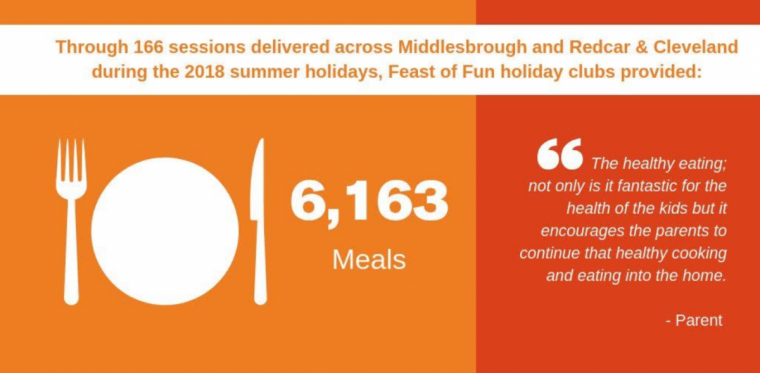How churches are stepping in to help British children going hungry during the summer holidays

This year, more than any before has seen a growing recognition that the school holidays present significant challenges for low income families reliant on free school meals. In addition, tax changes and welfare cuts made over the past decade have compounded the situation – often hitting those who are most vulnerable, the hardest.
Heads were turned when an All-Party Parliamentary Group (APPG) report, 'Hungry Holidays: A report on hunger amongst children during the school holidays', released in 2017, stated that up to 3 million children nationally are at risk of going hungry in the school holidays and that it isn't just their physical health that is affected.
With a growing number of families feeling the impact of the summer holidays, having the children at home and making the weekly budget stretch further for food, it can often mean that little is left for activities and treats.
Well-being, learning development and family life can be the hidden costs of a long summer when poverty starts to bite. The Joseph Rowntree Foundation recently released stats pointing to child poverty having increased by 30% since 2011/12, citing significant impacts on health, family relationships, education and skills.
As the Institute for Fiscal Studies predicts a 7 per cent rise in child poverty between 2015 and 2022, and other sources predicting child poverty rates could rise as high as 40 per cent, it is cause for growing concern.
The picture may be increasingly gloomy and challenging but there are initiatives, often led by churches, which are stepping up to help address this growing issue. Along with a host of charities, the Together Network, part of the Church of England's Church Urban Fund, have projects working in various places around the country to help find solutions.
In Chester, Transforming Lives Together is a locally based, passionate 'faith in action' advocate for social justice and equality. They aim to bring people together by stimulating and supporting church social action to help communities flourish and thrive in their Diocese. They have a holiday initiative called 'Filling The Gap' and have produced a guide for churches seeking to run effective summer activities to help relieve some of the pressure on families.

The basic principles of Filling The Gap are to not just make food available but also provide children with a fun time and a 'story to tell' when they get back to school. The initiative provides space for parents to interact with their children in a relaxed and supportive environment and promote a real 'community' feel by involving wider family members and others from the local area.
One of the Filling The Gap volunteers said: "Finding the extra food in the summer is one thing but also providing safe, fun activities can also be a stress for families. As children return to school after the holidays, they want to be able to tell an aspirational story about what they did and how much fun they had. That is what we want to help provide."
Another initiative is the 'Feast of Fun', which is a partnership of local churches across denominations, community groups and schools to offer holiday activities with healthy food across Middlesbrough and Redcar & Cleveland for more than 1,500 children, young people and their families.
Run by Together Middlesbrough & Cleveland, The Feast of Fun in Middlesbrough has worked with a wide range of national partners and companies like Quorn Foods, which supplies Quorn products and cooking experiences; and the National Literacy Trust, which supports reading and provides free books.
The Feast of Fun aims that in addition to the free food and locally based activities, all the children, young people and families also have the opportunity to enjoy a trip outside of their community, to places such as North York Moors, museums, RSPB centres and railways.
The scheme has proved a real community hub with more than 200 volunteers of all ages giving their energy and enthusiasm to support Feast of Fun. And since 2017 they have expanded to include a whole new generation of volunteers, older people through Faithfully Ageing Better, part of Ageing Better Middlesbrough, who run a number of projects and activities in local communities to reduce loneliness and isolation. This means that people over 50 intentionally get to share their time, skills and talents with the children and families to create a 'Feast of Fun across the Generations.
Feast of Fun is a great example of churches, community groups and schools working together to make a difference to family life during the school holidays. Children, families and volunteers have reported back the positive difference that this community initiative makes in the summer holidays
It's a model that has been picked up in Plymouth too where this year the National Lottery Awards for All have made funding available to expand the initiative across the Plymouth area.
Transforming Plymouth Together - a joint venture between Church Urban Fund and the Diocese of Exeter - works in Plymouth with the support of all the churches in the city to help tackle poverty. Their Feast of Fun events are also designed to be aspirational and bring the churches across Plymouth together in a common cause to provide free and healthy meals throughout the summer. Again, it's not just about food, the Feast of Fun combines fun activities every day in a safe environment which engage and care for a wide range of local people.
Chris Forster, Transforming Plymouth Together's Development Worker said: "This new funding from The National Lottery is great news as it will allow us to expand our work with families and make a real positive impact in many more people's lives."
As we read about cases of parents going without meals and surviving on cereal just to make sure their children are fed, and families being plunged into debt, just to get by trying to meet childcare costs, there is much more to be done.
If, as it is hoped, the Government extend a pilot scheme which supports children eligible for free school meals during the summer break, it may help to start turn the tide but, in the meantime, communities are more and more relying on charity and church-led initiatives to meet the need.
Matt Adcock is Head of Communications at Church Urban Fund. More information can be accessed via: https://togethernetwork.org.uk/











